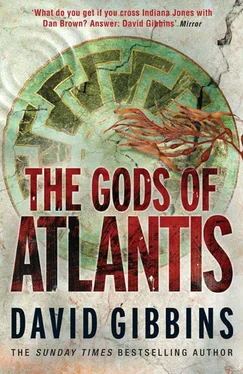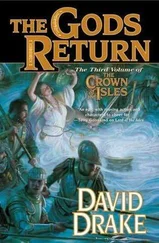David Gibbins - The Gods of Atlantis
Здесь есть возможность читать онлайн «David Gibbins - The Gods of Atlantis» весь текст электронной книги совершенно бесплатно (целиком полную версию без сокращений). В некоторых случаях можно слушать аудио, скачать через торрент в формате fb2 и присутствует краткое содержание. Жанр: Прочие приключения, на английском языке. Описание произведения, (предисловие) а так же отзывы посетителей доступны на портале библиотеки ЛибКат.
- Название:The Gods of Atlantis
- Автор:
- Жанр:
- Год:неизвестен
- ISBN:нет данных
- Рейтинг книги:3 / 5. Голосов: 1
-
Избранное:Добавить в избранное
- Отзывы:
-
Ваша оценка:
- 60
- 1
- 2
- 3
- 4
- 5
The Gods of Atlantis: краткое содержание, описание и аннотация
Предлагаем к чтению аннотацию, описание, краткое содержание или предисловие (зависит от того, что написал сам автор книги «The Gods of Atlantis»). Если вы не нашли необходимую информацию о книге — напишите в комментариях, мы постараемся отыскать её.
The Gods of Atlantis — читать онлайн бесплатно полную книгу (весь текст) целиком
Ниже представлен текст книги, разбитый по страницам. Система сохранения места последней прочитанной страницы, позволяет с удобством читать онлайн бесплатно книгу «The Gods of Atlantis», без необходимости каждый раз заново искать на чём Вы остановились. Поставьте закладку, и сможете в любой момент перейти на страницу, на которой закончили чтение.
Интервал:
Закладка:
‘You were the only one to use archaeology to help justify the extermination of an entire people.’
Jack gave Costas a warning look, seeing Schoenberg watching him. ‘Atlantis. That’s what we’re here to talk about, isn’t it?’
Schoenberg nodded, his lips pursed, then turned to Jack. ‘I am not an apologist for Nazi extremism, but I want to tell you how it was. We were not all madmen and psychopaths.’
Jack looked at him impassively. ‘James Dillen holds your classical scholarship in high regard.’
‘I was a sane man trapped in a lunatic asylum. Wewelsburg Castle was the asylum, and I did all I could to avoid spending time there. The expeditions were my escape, and we always found new reasons to go, to justify ever more fantastic projects. The moment I stepped away from the castle, I could look forward to the fresh air of the mountains, the sea, the ice, the thrill of new horizons to explore.’
‘Atlantis was one of those projects?’ Jack asked.
Schoenberg paused. ‘There were many schemes. You have heard of “world ice theory”, Welteislehre, yes? We were supposed to believe that our Nordic ancestors grew strong in a world of ice and snow; ice is the cosmological heritage of Nordic man. For a time, I had to teach this nonsense at the SS ideology school at Wewelsburg.’
Costas cleared his throat. ‘Did you teach them that world ice theory was promoted by the Nazis as the antithesis of the theory of relativity, which was seen as abhorrent because Einstein was Jewish?’
Schoenberg waved his hand. ‘More nonsense. More fantasy.’
‘The type of fantasy that helped to tip Himmler towards the Final Solution.’
Jack narrowed his eyes at Costas. ‘ Atlantis. Carry on, Professor.’
Schoenberg paused. ‘Atlantis was another of the schemes. Himmler was under the spell of a man named Karl Maria Wiligut, who claimed to be the last in a line of ancient sages who told of lost cities and vanished civilizations.’
Costas glanced at the notebook he had taken from his pocket. ‘ Wiligut. That rings a bell. Hard name to forget. Here we are. Karl Maria Wiligut also taught that the ancestral enemies of the German people were the Jews. Founder of an anti-Semitic league. Head of the Department for Pre- and Early History within the Race and Settlement Office. Funny name for a scholarly institution, don’t you think?’
Schoenberg opened his arms and sat back. ‘Is this to be an interrogation?’ he said, looking at Jack.
Costas stared at him, then closed his notebook and put it in his pocket. ‘Do carry on, please.’
Schoenberg paused, then leaned forward again. ‘In the mind of Himmler, Atlantis was the ancient foundation civilization, the original Aryan homeland. It existed in the Age of Ice, and evidence for it was to be found in Iceland, in Greenland, under Antarctica, high in the glaciers of the Alps and the Andes and the Himalayas, where people might live who were genetically untainted descendants of the original Atlanteans. But those of us who were genuine scholars knew better. When your IMU team discovered the Neolithic citadel in the Black Sea, I felt an extraordinary vindication. If Plato’s Atlantis was based on reality, we knew it could not have been in some remote location but must have been a vanished civilization of the Old World, right in the heartland of the first civilizations. The revelations of the Bronze Age, of the Minoans and Mycenaeans, of Troy, showed how much had been lost to history, and we assumed that Atlantis would be another civilization like that, waiting to be rediscovered by some latter-day Schliemann. But I also believed that a precocious early civilization would have spread its wings. My private quest was not to find Atlantis, but to find Atlantis reborn. We guessed that the most famous Bronze Age civilizations, the Egyptians, the Mesopotamians, the Minoans, might owe their extraordinary achievements to some precursor civilization, to refugees from Atlantis. But where else might the Atlanteans have gone?’
Jack leaned forward. ‘Did you find clues in the Heidelberg Codex?’ Schoenberg’s eyes lit up with fervour. ‘When the order came from Himmler to scour the ancient sources in the search for Atlantis, Heidelberg was the first place I went. I’d been just about to start research for my doctorate at the university when I was fingered for the Ahnenerbe. My subject had been another periplus, the ancient Periplus of Hanno, one of the other texts bound up in Codex Palatinus Graecus 398 with the Periplus of the Erythraean Sea.’
Costas looked at Jack ‘Were these original texts?’
Jack shook his head. ‘Tenth-century AD copies. Until Hiebermeyer’s discovery of those pottery fragments with the Erythraean Sea text, the Heidelberg Codex represented the earliest surviving versions of the geographical works it contains. The monk who transcribed them may well have copied from exemplars dating from antiquity, though probably even those were not the originals.’
‘That’s the key to what I’m about to tell you,’ Schoenberg said. ‘Even the most careful monks could lose concentration and introduce errors, and of course they copied any existing errors in the versions they were transcribing. Sometimes if they recognized errors they tried to rectify them, yet they often failed to grasp the original meaning and in so doing made it worse. The biggest problems are with texts that have also gone through translations. With those, the more knowledgeable monks sometimes added their own comments in the margins, where they felt they might fix a questionable translation or clarify a passage. Where they include reference to other ancient sources to make their point, this can reveal the existence of other works now lost.’
‘So what’s your point?’ Jack asked.
‘Do you remember which text comes next in the Heidelberg Codex after the Periplus Maris Erythraei?’
Jack cast his mind back to the day he had spent with Maria and Jeremy at Heidelberg. ‘It’s your speciality, the Periplus of Hanno the Carthaginian, the extraordinary account of Hanno’s voyage in the sixth century BC down the west coast of Africa. Folio pages 55v to 58v, if I remember correctly. I can vividly recall the excellent seminar you gave on it at Cambridge when we first met. The Periplus of Hanno really illustrates your point about transcription problems. It was originally inscribed on bronze tablets on a pillar in Carthage, and then was translated into Greek. We glanced at it when we were examining the codex but didn’t have time to study it in detail.’
‘Nor did I, to begin with,’ Schoenberg said, beaming. ‘My study of the codex for my doctoral research was interrupted when I was recruited into the Ahnenerbe. It was only when they sent me back to the library to look for clues to Atlantis that I had the chance. And even if you had read it, you wouldn’t have seen what I saw.’
‘Go on,’ Jack said.
Schoenberg picked up the leather document case in front of him and opened it, taking out a brown envelope. He held it for a moment, then looked at Jack. ‘You must understand me. I’ve kept the contents of this envelope secret since the war. In April 1945, when the Russians were closing in, I was forced into the Volkssturm militia for the defence of Berlin. My unit defended the western part of the Tiergarten below the Zoo flak tower. I was one of the lucky few who were captured. I say lucky now, but we didn’t think so at the time. We were taken to a prisoner-of-war camp in Siberia. Most of my comrades who weren’t summarily executed or worked to death died of disease or starvation. When I was finally released in 1954, I went to Germany to retrieve this case from where I had hidden it and then took advantage of the lifting of immigration restrictions on former Nazis by the Canadian government to emigrate. They needed manual labour, and for several years I worked as a lumberjack. Then I was able to resume my studies, to complete my doctorate and embark on an academic career. I married, had children and now have great-grandchildren. The past was behind me. I had no wish to reveal anything while my children were still growing up that might expose what I had been and what I had done.’
Читать дальшеИнтервал:
Закладка:
Похожие книги на «The Gods of Atlantis»
Представляем Вашему вниманию похожие книги на «The Gods of Atlantis» списком для выбора. Мы отобрали схожую по названию и смыслу литературу в надежде предоставить читателям больше вариантов отыскать новые, интересные, ещё непрочитанные произведения.
Обсуждение, отзывы о книге «The Gods of Atlantis» и просто собственные мнения читателей. Оставьте ваши комментарии, напишите, что Вы думаете о произведении, его смысле или главных героях. Укажите что конкретно понравилось, а что нет, и почему Вы так считаете.












